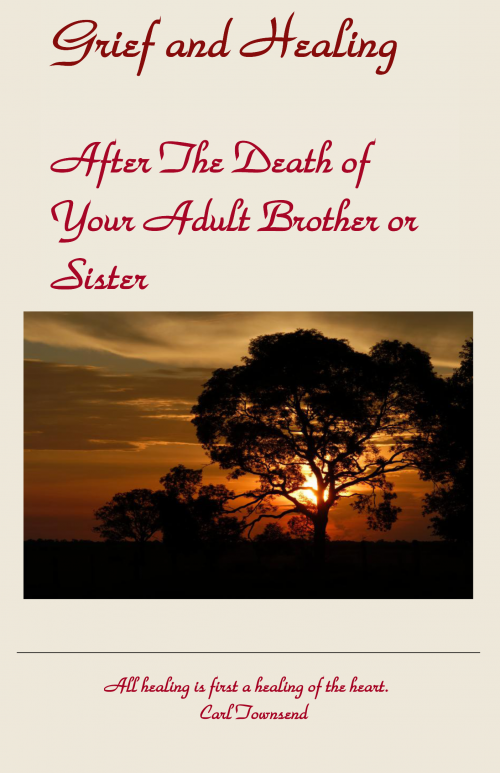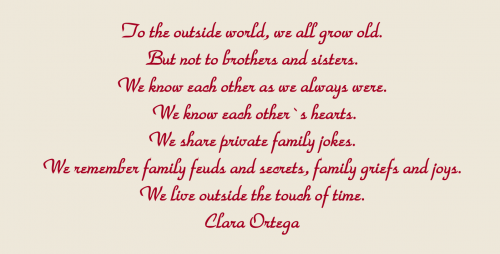

On Valentine’s Day, I was at work when I got a call from my brother. At the time, our Mom was living with him, so I naturally imagined his call had to do with her. His stunning news, however, was that our younger brother, Richard, had died suddenly, within the hour, of a heart attack. In my work as a Hospice grief counselor and from my experience with other losses in my life, I knew a great deal about death and grief. I did not know anything about losing an adult sibling. Now I do. And so do you.
Regardless of their emotional or geographical closeness, our siblings and we share an existential closeness without equal. We hold the closest positions on the family tree. Our origins, genetic and otherwise, have more in common than those of anyone else who will become part of our lives. Yet the death of a sibling is often seen as a less significant loss than some others. Perhaps because, as adults, we may have spouses and children who are most dear. Perhaps because the loss of a child at any age is seen as a tragedy for parents. Perhaps because many of us live far away from our siblings, so their absence is not obvious to those in our daily lives. So people’s attention tends to focus on our sibling’s husband, wife or life partner, or on our nieces and nephews, or on our parents. We’re likely to be asked how someone else in the family is getting along, without acknowledgement our own loss.
You and I know that a sibling’s death is one of life’s major losses. Even we may not at first realize how much we are affected. Think about it. Most of us figure we will have to deal with the deaths of our parents. If we are parents, we fear the loss of our children. As spouses and partners, we wonder who will live longer. Few of us give much thought to the possibility that we’ll have to endure the death of a sibling. When it happens, it comes out of nowhere.

At first, because I lived across the country from the rest of the family, I felt the loss was mostly theirs. I planned not to take the time and expense to travel to the funeral. They would do fine without me. Within 24 hours, I passed through the feeling that I should go to support my mother and remaining brother, to the realization that I wanted to be there. This was my brother, my loss, my grief and the bond unique to siblings remained strong. The next day I booked travel and made plans to be there.
Every person’s grief is completely individual and unique. Anything you read here, anything people tell you or you learn in other ways, may or may not be true for your experience after the death of your sibling. Your feelings may be different from those of other siblings or family members. Though you all lost the same person, each of you had a relationship with your sibling that was unlike anyone else’s. Grieving involves dealing with what the death means to you, how your life is changed and how you will adjust to life without your sibling. Usually the answers to those questions are not immediately clear. That’s why healthy grief takes awhile to unfold. It’s also why many people describe grief as an up and down experience.
When everyone around you recognizes the impact of your loss, grieving is hard enough. When people innocently forget how significant it is to lose an adult brother or sister, you can also lose track of its importance. Or wonder if your feelings are appropriate. Or prematurely consider your grieving “over” whether or not that is true.

When I returned to work, I noticed some people seemed a bit ill-at-ease around me. I soon found that if I responded to polite inquires about how I was doing with honest information about my grief, people relaxed and were able to listen supportively. It seemed that knowing I was OK with talking about my grief lifted the burden of worry that someone might upset me by bringing up the subject.
Unfortunately, grieving people often end up getting by with too little support. This may be especially true when your sibling has died and people don’t understand how much it affects you. If they are to support you, you may need to help them appreciate who your brother or sister was, the kind of relationship you had and just how challenging it is to face the death. That may take more emotional energy than you have right now. Perhaps at some time you may be able to open up to others so they can reach out to you.
I had been leading grief support groups for many years. I truly believed these groups provided the best setting for care and encouragement of grieving people. Facilitation of grief groups was at the heart of my role with Hospice. I realized that what was good for others would probably be good for me. I learned that a neighboring Hospice had a group starting soon and I signed up. It was an excellent way for me to get something very valuable that I was unlikely to get any other way. By faith in grief groups was confirmed by the help I received.
When those closest to you are stricken with the same loss, you can love each other but may not be able to provide much grief support. When those in your network of friends and colleagues are unaware of the impact of your loss or unsure how to approach you, you may feel isolated in your grief. A group of people going through similar circumstances at the same time, yet not involved in each other’s lives, can provide a most welcome setting for sharing your feelings and thoughts, telling your story, witnessing your pain and your healing. And in that setting, you engage in supporting others, which contributes to your own healing process.
Grief support groups, classes and programs are available in most communities. You can honor your sibling – and yourself – by taking positive steps to care for yourself in your time of grieving.



